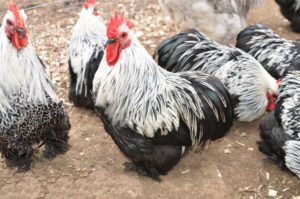
Good chicken-keeping practices will keep your flock in tip-top shape.
Best Practices to Keep Your Chickens Healthy
Owning chickens is becoming more and more widespread; people everywhere are keeping chickens from a small scale back yard to a full-scale business. Raising chickens is a gratifying experience that brings enrichment, food, and for some a steady stream of income. They are economical to own, easy to care for with minimal attention needed and it is much easier to care for a healthy chicken than a sick one. Chickens are resilient to all types of weather and environmental conditions; however, there are “best practices” we should follow as chicken keepers to keep them healthy and protected from the environment and predators.
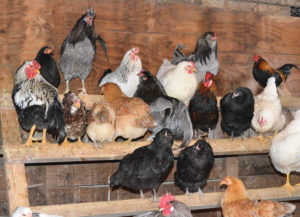
Flock resting on a simple roost made from 2x4s.
A Safe Place to Roost
Most importantly, your flock needs a secure enclosed building to roost in at night for protection from the elements and predators. Inside the enclosure they need a roost, which makes them feel safe from predators, it is more sanitary, and keeps them warmer on colder nights. It prevents the phenomena of chickens smothering one another when they don’t have a roost, with no perch they tend to bunch up in a corner, and invariably those on the bottom will be at risk of suffocating; however, this is more likely to happen with younger birds.

A secure enclosure ensures the safety and well being of your flock.
A secure enclosure will safeguard them from predators and rodents that are looking for an easy meal. An enclosed coop protects your flock from raccoons that can rip through wire fencing, mink that can squeeze through the smallest holes, or a fox that can dig under the fence. Once a predator makes a kill, they will usually keep coming back for another. Always keep small holes covered, to keep mink and rodents out. If a mink finds his way in, he can potentially kill multiple chickens. There have been instances where mink have killed 20-30+ chickens in one night; unfortunately, mink enjoy killing for fun. Rodents are ruthless, they carry diseases, devour chicken food, their constant chewing will damage your building, and they eat the feathers off of chickens when they are sleeping.
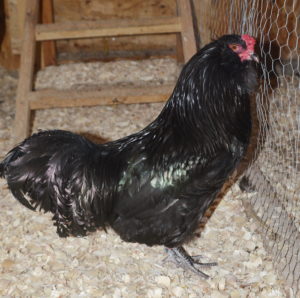
A clean dry chicken house will help keep your birds happy and healthy.
Clean Coop and Ventilation
Strive to keep your coop reasonably clean and dry, wet conditions create an ideal environment for parasites to flourish and they will infect your chickens, causing them to eat more and lay less. A buildup of manure can produce ammonia, which is very unhealthy for sensitive respiratory systems and can be detrimental to their health. Chickens give off a surprising amount of heat that can cause humidity levels to rise in the coop, causing frostbite and illness. Be sure to have good a ventilation system in place, using vents, wall fan, or windows to keep your coop dry and ammonia at bay.
Regularly, clean your coop by removing old debris and replacing it with fresh bedding of wood chips, straw, or sand. Each time you clean the coop, it is a good practice to spray for lice and mites with permethrin. You can also have a nice smelling coop and deter rodents at the same time by adding up to one half teaspoon lavender essential oil to permethrin water mixture. Rodents will avoid the area because lavender confuses their smelling sense and they cannot detect their predators.
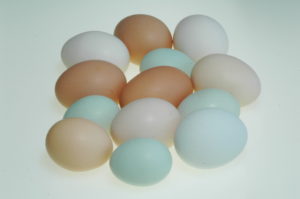
Healthy chickens will reward you with quality eggs!
Parasite Infestation
Chickens can easily be infected with parasites; just by their nature, they eat bugs. Many bugs are carriers of parasites, the earthworm is a carrier of gapeworm and tapeworm, both can infect poultry. It is recommended you consult your veterinary for treatment. He will likely recommend a fecal float, and if needed an action plan to cure your poultry. It would be a good idea in advance to locate a veterinary that treats poultry since many do not treat chickens.
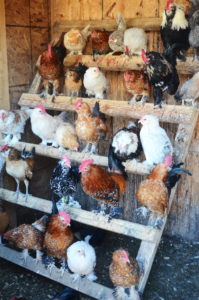
Bantams enjoying their window facing roost for plenty of light and sunshine.
Feed and Water
Keep waters and feeders clean by cleaning them out on a regular basis. Use waters and feeders that can be hung or set up higher, to prevent chickens from scratching debris into them. Keeping chickens healthy starts on the inside, feed them quality feeds, according to their lifecycle, for example, feed chick starter to chicks and layer feed to layers. It is also wise to give them that extra boost, by feeding them probiotics, vitamins, minerals, and herbs. Herbs like oregano, thyme, and lavender are used around the world to prevent disease and ward off pests.
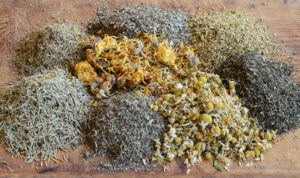
There are many herbs that can naturally contribute to the health of your chicken.
Good Quality Care
Rather you’re a poultry hobbyist, a backyard chicken keeper, or own a flock that contributes to your livelihood, following these common-sense practices will keep your birds healthy and productive. Give your flock protection from the element and predators with a secure enclosure. Use due diligence in keeping the coop clean, feeding them quality feeds, and supplements will ensure their health and safety.
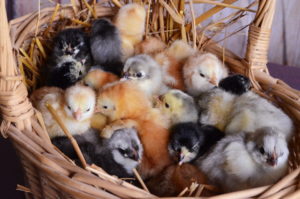
Healthy chickens produce a lot of healthy chicks!
You can follow me on TarBox Hollow Poultry twitter Pinterest & Grit










